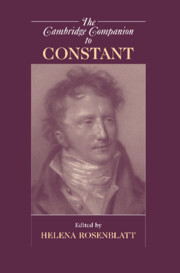Book contents
- Frontmatter
- Introduction
- 1 Benjamin Constant: Life and Work
- Part I The Political Thinker and Actor
- 2 Liberalism’s Lucid Illusion
- 3 The Liberty to Denounce: Ancient and Modern
- 4 Constant’s Idea of Modern Liberty
- 5 Benjamin Constant and the Terror
- 6 Constant’s Thought on Slavery and Empire
- 7 Benjamin Constant as a Second Restoration Politician
- Part II The Psychologist and Critic
- Part III The Analyst and Historian of Religion
- Conclusion
- 15 Eclipses and Revivals Constant’s: Reception in France and America 1830-2007
- Bibliography
- Index
- Series List
2 - Liberalism’s Lucid Illusion
from Part I - The Political Thinker and Actor
Published online by Cambridge University Press: 28 July 2009
- Frontmatter
- Introduction
- 1 Benjamin Constant: Life and Work
- Part I The Political Thinker and Actor
- 2 Liberalism’s Lucid Illusion
- 3 The Liberty to Denounce: Ancient and Modern
- 4 Constant’s Idea of Modern Liberty
- 5 Benjamin Constant and the Terror
- 6 Constant’s Thought on Slavery and Empire
- 7 Benjamin Constant as a Second Restoration Politician
- Part II The Psychologist and Critic
- Part III The Analyst and Historian of Religion
- Conclusion
- 15 Eclipses and Revivals Constant’s: Reception in France and America 1830-2007
- Bibliography
- Index
- Series List
Summary
The Constant I propose to exhume here numbers among those authors who drew the most profound lessons from the Revolution’s failure to achieve a stable political form, among the most acute analysts of the democratic transition. When we read Constant, he emerges as one of the very rare writers capable of enlightening us about the great and deeply mysterious transformation from which modern society arose. He can do this because he methodically took stock of where he stood in relation to that transformation. He was also a politician whose options in the crucial years 1814 and 1815 were as inconsistent as his choices were unfortunate - but that Constant may be left to would-be prosecutors; he does not interest us here. Let us take seriously, however, the man who more than anyone else strove to characterize the distinctive features of “liberty among the moderns” and who, in seeking a theoretical answer to the key question that stumped the revolutionary will - what does the representative principle actually imply about the organization of power? - had the exceptionally good fortune to foresee the turn that history would actually take. Although circumstances conspired against him and led him to choose the wrong path for himself, he was nevertheless remarkably prescient about the course of history and was able to specify in theory the conditions under which a regime according a proper place to civil liberties did in fact establish itself.
- Type
- Chapter
- Information
- The Cambridge Companion to Constant , pp. 23 - 46Publisher: Cambridge University PressPrint publication year: 2009
- 5
- Cited by



